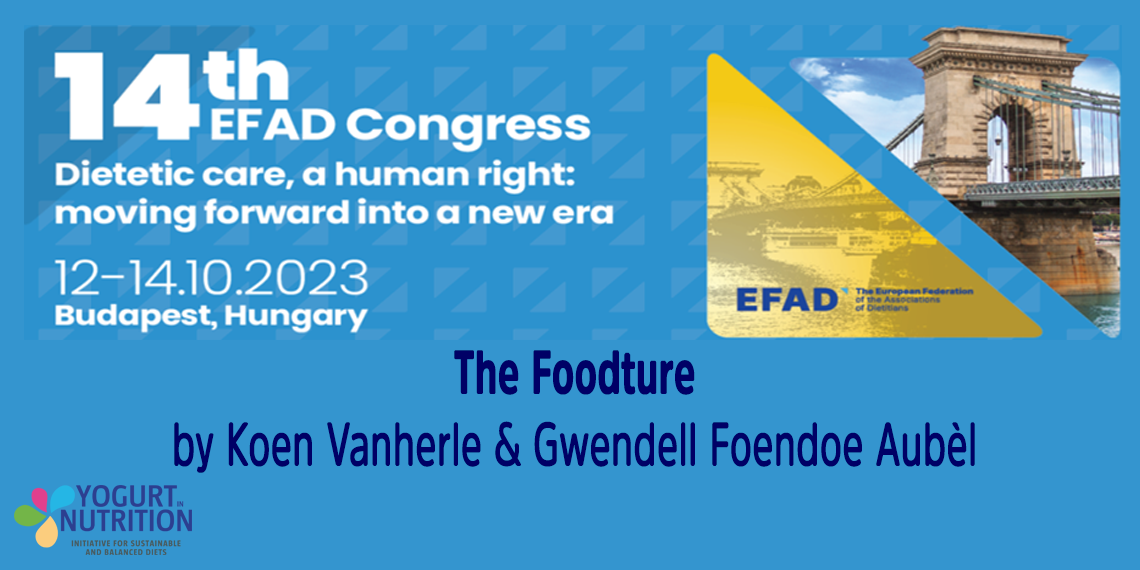In October 2023, the 14th EFAD (European Federation of Association of Dieteticians) Congress was the occasion of exchange and networking around nutrition. We were there to share with you some topics.
The Foodture – A collaborative international learning experience about sustainable nutrition and entrepreneurship
The Foodture is an international learning initiative about “sustainable food and nutrition” for students and lecturers from nutrition-related programs all over Europe. It started in 2017 as a co-creation week and has evolved into an Erasmus+ Blended Intensive Program (BIP), with participants of various backgrounds and cultures.
This mixed background contributes to the key objective of developping professional skills for international collaboration on sustainability. This requires crossing borders and entrepreneurial thinking through innovation and creativity.
Since 2021 the Foodture concept has been extended. It now consists of a series of online sessions (Foodture Academy), and a physical exchange week (Foodture Meets). Participants can benefit from Erasmus+ short mobility funding:
Learn more with Koen Vanherle and Gwendell Foendoe Aubèl
Can you introduce yourself?
My name is Koen Vanherle. I’m from Antwerp University of Applied Sciences and Arts and from Belgium. I’m a teacher. I’m also the international coordinator. I work for EFAD in several work packages. And this year we presented the Foodture and the collaboration.
My name is Gwendell Foendoe Aubèl and I am a senior lecturer at The Hague, the University of Applied Sciences, and I’m also the international program coordinator for the internationalization of our department. We organize this nice event, “the Foodture”, where we collaborate with each others and with our partners.
What is “Foodture”? What does it consist of?
Koen Vanherle (KV): The “Foodture” is actually a learning initiative. It started six or seven years ago, towards the two universities of The Hague and Antwerp as an international week. We wanted students to go abroad, learn from each other in an interesting and fun way and on the current topics about sustainability. We moved on and decided to choose a name for it. The “Foodture” speaks for itself… to prepare students for the future about sustainability. And in this whole path towards where we are now, we did some changes, we improved it, we expanded it to an online part. We want to give students a learning opportunity about sustainable nutrition.
Why is it important to have international exchanges on sustainability?
Gwendell Foendoe Aubèl (GFA): Well, sustainability is international, so you can find it everywhere. It deals about our future, with how we are with food, how we see each other, how we promote each other to have a better sustainability when thinking about food.
And our students are part of the future. If we don’t teach them what they’re going to encounter in the future during their curriculum, we’re not preparing them to be the global citizens we want them to be.
Actually students are very happy and glad to meet other cultures, other beliefs about food, about sustainability. Some students are vegan, some are vegetarian and some people are starting to get the sense of why we should eat less meat. Our program is getting them in contact with other things or topics as the sustainability of the seas for example.
KV : Actually, sustainability is a global issue. The challenges that come with it can only be tackled by international collaborations. It also makes humans aware that you cannot solve such a big issue without working together.
Can you share some specific examples with us?
KV: We have ethical lectures to give the students some basis to think about. We do that mainly online so they can be prepared. We ask the students who participate in the in-person week to follow also this online part. If you lack the basic knowledge on what is sustainable, how can you apply it into the challenge that we work on during this week?
During the week, we have a few more lectures, but the ones that are the most appreciated are those who are inspiring. For instance, we invite alumni to share their experiences. And there is not only lectures, it’s also about inspiration, entrepreneurship and fun, of course. If you go abroad for a week, you want to learn but you also want to have a good time, make some friends, learning in a nice way, with social activities and visits.



